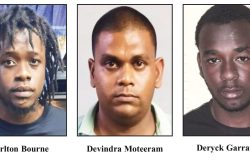There will be no change to the format of the National Grade Six Assessment (NGSA) for 2025, nor for 2026. Speculation about potential changes to the exam format has been dismissed by the Education Minister.
“There is going to be no change to NGSA this year, and there is going to be no change to NGSA next year. These are kids who were the Covid children. I think we have two more years for the nursery cohort to come through. So, no changes to NGSA this year and next year,” Education Minister Priya Manickchand confirmed last Friday at her year-end press conference at the NCERD’s boardroom.
In response to calls for the removal of Social Studies from the NGSA, Manickchand stated that such a change would not be happening. She emphasized the importance of exposing students to a broad range of subjects.
“I have heard the call for core subjects to be offered. I like our children doing a little bit of everything and getting some exposure. We live in a very diverse country how are Georgetown children going to learn about the vaqueros in Region 9? Or how are the hinterland children going to learn about diyas of the Hindus if we drop Social Studies? These things have value. Do we go too deep? These are questions we should be asking. Is our science too deep? Should we go so far? Or maybe we should test on these topics at a more age-appropriate time,” she stated.
Manickchand noted that the NCERD has been constantly examining these issues, but there are no plans to make any changes at this time.
Chief Education Officer Saddam Hussain also addressed the topic, stating that while the Ministry is revising the education offered at the primary level, there is a particular focus on the subjects being taught and when they are introduced.
“What we need to look at is in Grade 7 the number of subjects being taught. We have started to look at the List C schools. It cannot be that you come into the school with a low grade and do 13 subjects,” Hussain explained.
In light of this, the Ministry is introducing the Caribbean Certificate of Secondary Level Compe-tence (CCSLC) program-me, which will help streamline the curriculum for secondary-level students.
“We’ve actually trained over 800 teachers for the CCSLC programme, and we will roll it out to 72 schools,” Manickchand said. The programme will see students focus on six core subjects: Mathema-tics, English, Social Studies, Science, one foreign language (likely Spanish), and either IT/Digital Literacy, Agricultural Science, or Home Economics.
The CCSLC programem will be offered up to Grade 9, allowing students to practice and refine these core subjects. “You work on the mathematics principles until you become competent in them,” Manickchand explained.
Several Caribbean countries, including Grenada and Antigua, are already implementing the CCSLC, which is being overseen by the Caribbean Examina-tions Council. “It’s being run by the Caribbean Examinations Council. That’s what we want to do, and it will eventually be offered across the country. For now, we’ve begun with these 72 schools,” Manickchand added.








